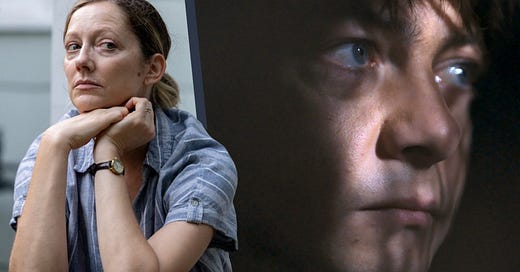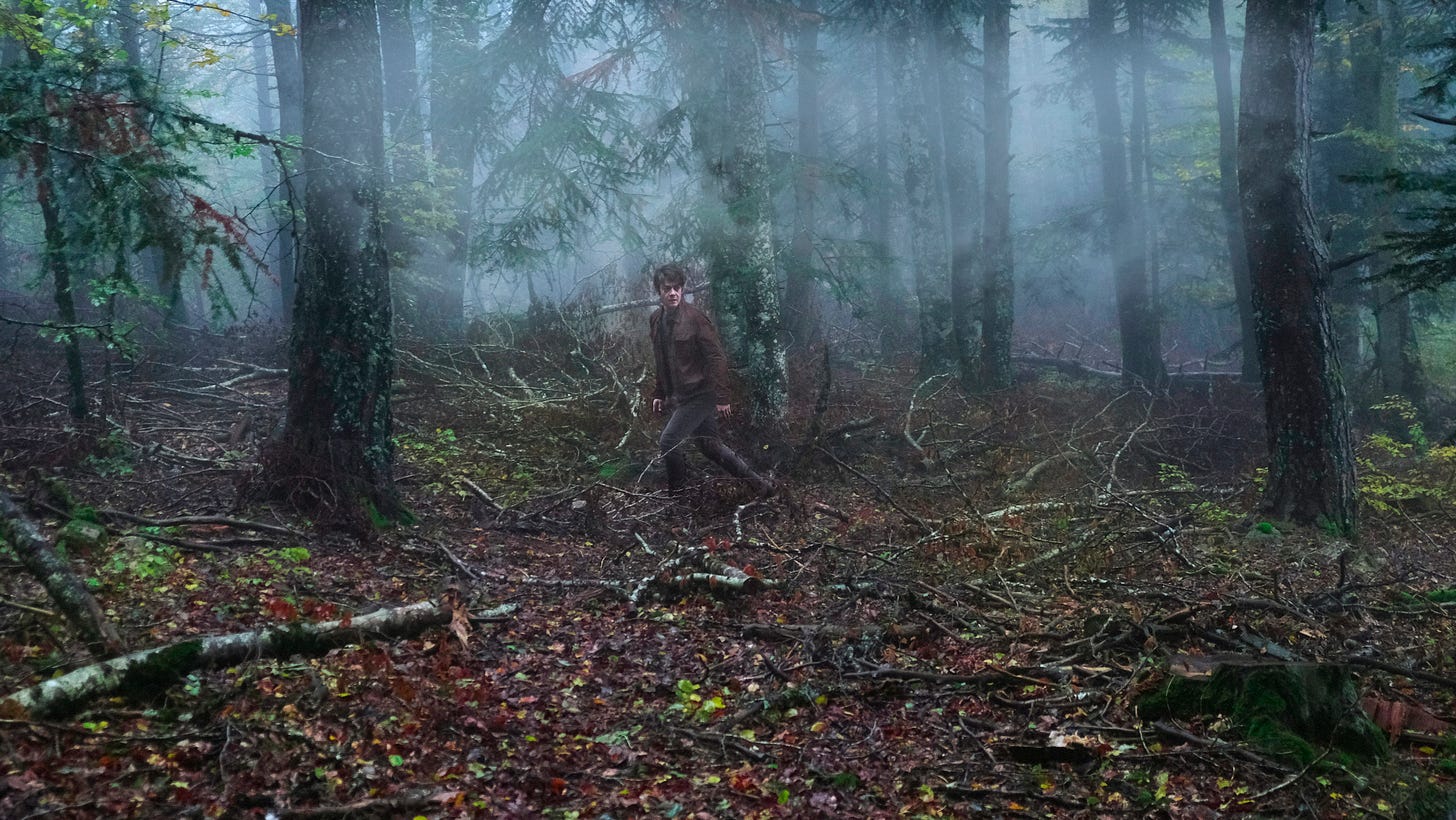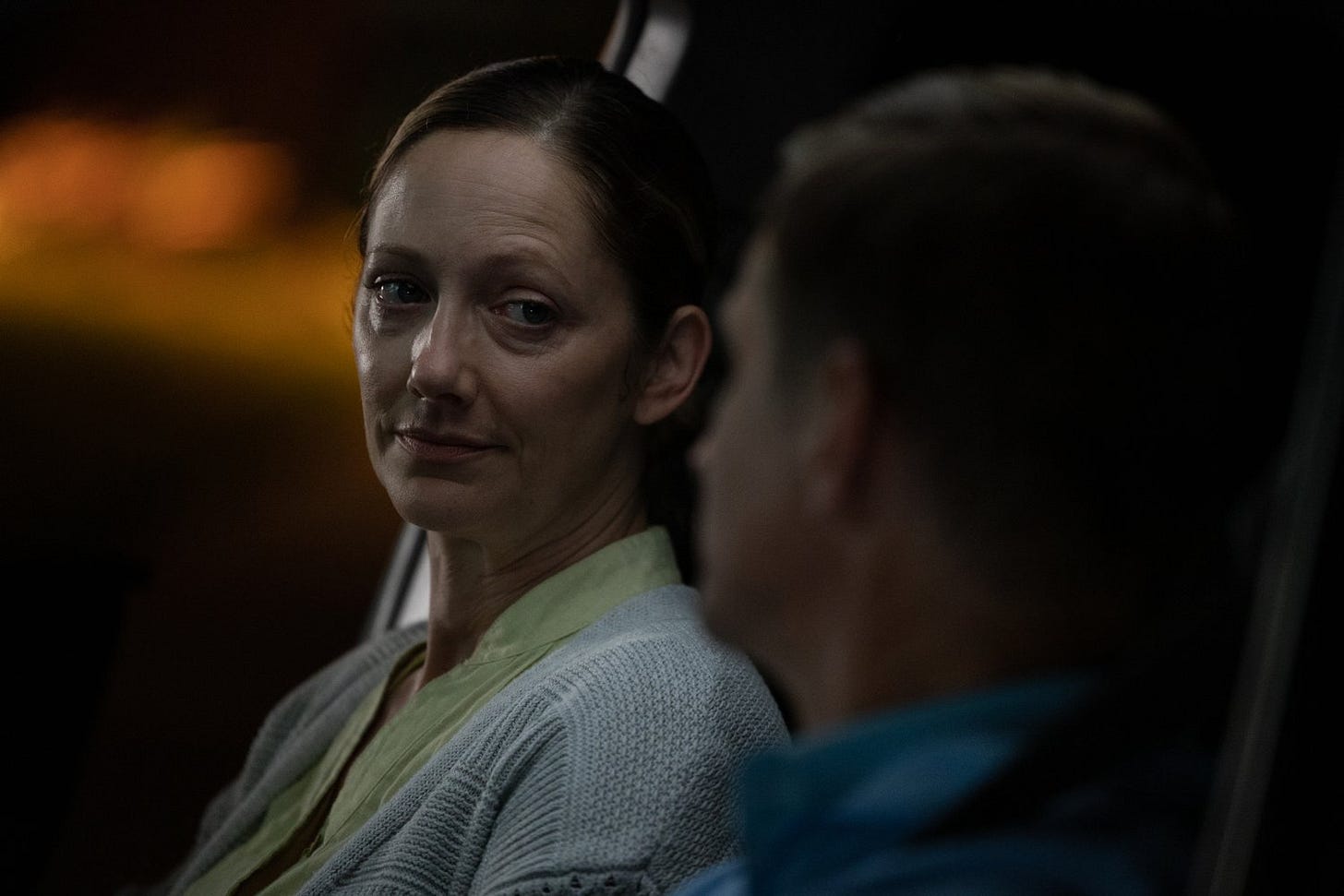Misericordia & Eric LaRue Review: Misery loves company
Two very different movies about death that are worthy of your gaze.
MISERICORDIA
When Jérémie (Félix Kysyl) returns to his hometown to pay respects to his recently deceased mentor, he probably didn't anticipate an extended stay in Purgatory. Yet that's just what he gets in Misericordia, Alain Guiraudie's darkly hilarious meditation on death, desire, and evading responsibility in this crumbling world of ours. The film begins with a funeral, and it never ends. It stirs up troubling ideas that grow like the healthy porcinis and morels foraged by locals in the forest nearby. Some sprout from the most unexpected places.
In Misericordia, death and desire are equally charged forces. Longing glances are exchanged over glasses of beer while flies buzz in the background. It's like the Grim Reaper is sitting there with these people, the scent of his last visit heavy in the air.
Selfishness is also a big theme. People frequently insist upon others for their comfort. Example: Jérémie is asked by his mentor's widow, Martine (Catherine Frot), to stick around after the funeral. "I don't want to mourn alone," she tells him. One night, they share whiskey and gaze intently at a photo of her late husband in a bathing suit: they both loved him. Their body language in this moment suggests that Martine may desire Jérémie as well, creating a complicated triumvirate of forbidden passion where the survivors appear as tethers to the one they've lost and hold onto each other accordingly.
Jérémie's not above taking advantage of this sexual tension; earlier, Martine asked him to take over the family bakery, an offer to which he seems vaguely receptive. Whether he's capable of such commitment — Jérémie' has been unemployed for months, his girlfriend back home is dumping him, and neither fact seems to bother him — is beside the point. The real question is: who is he staying for, and why? The funniest part of all this is that there may not be an answer — or that the answer is everyone, and just because. All Misericordia tells us in this regard is that the heart wants what it wants, and the heart can be one mercurial pain in the ass.
Naturally, Martine and Jérémie's relationship pisses off her son, Vincent (Jean-Baptiste Durand). Guess what: there's unresolved tension between him and Jérémie, too. Naturally, Vincent isn't pumped about this old friend crashing in his childhood bedroom or getting cozy with his mom. He also isn't thrilled that she offered Jérémie the family bakery; he retaliates with unpleasant 4 AM wake-up calls, making it very clear that Jérémie's presence isn't welcome. Jérémie stays anyway, seemingly out of spite, and Vincent, a known hothead around town, grows hotter.
Misericordia is a thriller of compounding events that unfold drowsily, making its abrupt story shifts blisteringly funny. After a mesmerizing first half-hour of bizarre human interactions and open instances of hostility (one involving a shotgun), Jérémie's situation evolves into a missing persons case that pulls in two police officers (Sébastien Faglain and Salomé Lopes) determined to incriminate the town's latest arrival. A local reverend (Jacques Develay) steps in to help and packs one hell of a secret that could make Jérémie's stay permanent.
Even after spending a couple of hours with him, it's still tough to get a read on what Jérémie wants. He drifts into these people's provincial lives with his chaotic desires (directing some of them toward a confused former classmate played by David Ayala) and slinks into the woods after each brutally awkward interaction as if he's committed some terrible crime. When the film takes a drastic turn and he finally does something irretrievably bad, there's sick fun in watching someone who had previously seemed so indifferent to other people's emotions finally squirm with guilt. If he feels grief, it's almost certainly for himself. The world turns, indifferent to the calamity he's made of life.
Fittingly, Guiraudie's film concludes in a type of stasis, locking Jérémie in the perpetual amber hues of that forest where the mushrooms grow. With stasis comes irresolution, or at least the illusion of it — Purgatory for the passionately careless.
8.5 / 10
Misericordia is in limited release now. If you live in Chicago, you can catch it at the Gene Siskel Film Center. For showtimes, click this.
Written and directed by Alain Guiraudie.
Cinematography by Claire Mathon.
Starring Félix Kysyl, Catherine Frot, Jacques Develay, Jean-Baptiste Durand, and David Ayala.
Produced by Charles Gillibert.
Unrated. Prepare yourself for unexpected mushrooms.
ERIC LARUE
Tragedy makes putting the pieces of a normal life back together feel impossible. In Michael Shannon's directorial debut, Eric LaRue, it is. Judy Greer stars as Janice, a shattered mother of a school shooter, on a fruitless journey to find the words to describe how she feels and the nerve to have these feelings at all. It's a wonder she bothers; either the people in her community are unresponsive to her grief or simply unable to understand it. They recite hollow reassurances and speak around her as though she might suddenly disappear if they avoid addressing her directly. Many scenes depict Janice staring into the distance, pulling on a cigarette, her face an expressionless mask of internal collapse. Life has become mechanical; when she goes grocery shopping, items simply fall into her cart. For her, it doesn't matter what's for breakfast. It may never matter again.
Eric LaRue is based on a stage play by Chicago playwright Brett Neveu, who also wrote the screenplay. Shannon previously directed Neveu's work at A Red Orchid Theatre, and their collaboration appears to have fostered creative stability for his debut feature. As an actor, Shannon is unconventional; his performances are exhilarating and often unusual. It's not surprising, then, that his first movie would be just as strange. It was difficult to anticipate how he'd direct a story steeped in sorrow. I was pleased to discover that he chose to take it to bizarre places.
Shannon's directorial choices create quite the emotional gauntlet. The raw pain and isolation inherent in the story are presented as poignantly dull or funny, depending on the scene — a tonal balance that Shannon sometimes struggles to maintain. Grief can lead to awkward situations; Eric LaRue sometimes plays them for laughs. I chuckled during the most peculiar moments, such as when Ron, Janice's born-again husband played by Alexander Skarsgård, declares himself "Jesus crazy." Then I questioned if I was meant to.
Remember, Ron's son killed three people, too, but I wonder if we're supposed to pity him as we do Janice. Rather than embracing his wife and confronting the consequences of their son's crime together, he retreats into a slick Evangelical church (led by a haughty Tracy Letts) and, potentially, into the arms of a flirtatious fellow parishioner (Alison Pill). He seeks solace in Jesus, whose presence he carries wherever he goes, even to dinner at the local bar and grill. Pill's character, Lisa, showers him with praise, particularly after he comforts another grieving mother — whom we learn is the parent of one of his son's victims — when she collapses in church, speaking in tongues. Lisa rewards his faith with lingering hugs and lusty validation; as Ron slips further into this world, he leaves Janice to face her grief alone, to wallow in the remnants of their broken lives: the empty kitchen table; Eric's bedroom, ravaged by police; the front porch, where she once watched her boy play and now drifts to sleep after hours of aimless despair. Eventually, Ron appears fully content with his lot in life, and the movie moves on without him.
Shannon allows his cast the freedom to explore the story's charged emotions, and their instincts lead them to curious places. As Lisa, Pill displays peak righteousness with manic desire lurking behind every glance she throws Skarsgård's way. As Ron, Skarsgård presents his character as both a lost soul and a complete dope (he sports a ridiculous haircut with one side perpetually sticking up like a child needing his mother to comb it down). In this film, Greer appears to be the only person with her feet planted in reality, which explains why her expressions often seem stripped of emotion; her community's lack of reason, empathy, and sense has rendered her feelings null. Many scenes are shot from a distance by cinematographer Andrew Wheeler, framing the characters as small and fragile against the vast emotional expanse surrounding them, yet the performances are never diminished.
In Eric LaRue, catharsis is unattainable because people are people. They're stymied by the complexity of their emotions, and the strange surreality of grief makes every communication a riddle. A significant part of the film centers on Janice working with her eager-beaver pastor (Paul Sparks) to set up a meeting with the victims' mothers. When they finally meet, no one finds common ground in their despair — maddening. This raises complex questions about who is entitled to grieve in the aftermath of murder; Janice's son is still alive — incarcerated, but alive — while the other women are now without theirs, clinging to their memory through anger, confusion, or a mix of both. Janice mourns for her child but has no outlet for her sorrow or anyone to share it with. Eric is here. Eric is gone. In the end, there's no difference.
7 / 10
Eric LaRue is in limited release now. If you live in Chicago, you can catch it at the Gene Siskel Film Center. For showtimes, click this.
Directed by Michael Shannon.
Screenplay by Brett Neveu.
Cinematography by Andrew Wheeler.
Starring Judy Greer, Paul Sparks, Alison Pill, Tracy Letts, Annie Parisse, and Alexander Skarsgård.
Produced by Sarah Green, Karl Hartman, and Jina Panebianco.
Unrated. Includes concise descriptions of murder and the Christian urge to sin.






